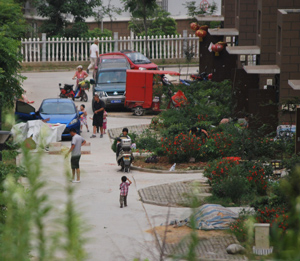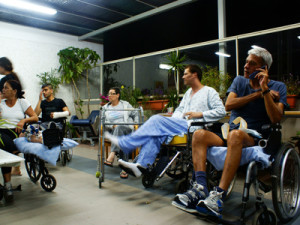An editorial in The Florida Times-Union warns that the US is on a track to spend $40 trillion on Alzheimer’s care in the next 40 years. Are there a solutions to this problem?
Yes, there are solutions. These require new thinking. The thinking that memory care needs to cost $84,000 per year is broken. The lack of strong medical models for intervention, prevention and cure call for sustainable care models.
 The solution resides in our neighborhoods and families. Keep in mind that you have a place in these statistics! The one-in-eight mentioned who will develop Alzheimer’s includes your parents, your siblings, your friends, your neighbors, and YOU! Are you the one diagnosed or among the seven friends and family members?
The solution resides in our neighborhoods and families. Keep in mind that you have a place in these statistics! The one-in-eight mentioned who will develop Alzheimer’s includes your parents, your siblings, your friends, your neighbors, and YOU! Are you the one diagnosed or among the seven friends and family members?
So, let’s make it personal and assume that YOU have the diagnosis. As your cognitive abilities decline, how will your emotional and spiritual health be cared for? How will you avail yourself of the beauty and joy the world still offers? Who do you want near you? Whose face will bring you comfort? Whose touch will make you feel alive? What music will make your spirit dance?
You live in a place you love, don’t you? Isn’t that why you moved into your neighborhood? Do you have friends or family in your neighborhood? Do you belong to a religious organization or service club in your neighborhood? Do you know the people you see at the grocery store or hardware store or park or bus stop? If the answer to all of these is “no”, then consider enjoying your neighborhood more or moving to someplace you can enjoy.
The current model of $84,000 per year care is based upon moving you away from your neighborhood to a place where strangers will attend to what needs they can until you are dead. It may be a difficult long journey for your friends and loved ones to visit, so visits will be infrequent. There’s not a budget to get you to your Rotary Club meetings where you’ve had lunch on Tuesdays for the last 30 years, so you will have to make due with whatever appears from the mysterious kitchen and an activity designed for people like you. The problem is that you are not like other people and your friends and family know what you respond to on levels beyond cognition.
It costs about $100 per day or $36,500 per year to care for a person who is not well enough to live on their own. Every neighborhood should have such a home. This cost level is achieved at a home with 10 to 12 residents when there is a mixture of residents with and without cognitive impairments and physical impairments. Concentrating and segregating persons with Alzheimer’s degrades YOUR quality of life, drives up costs, and isolates you from the life you have created for decades.
A solution involves creating a home in your neighborhood where you can go to complete your life when living in your home becomes unworkable. The solution involves you participating in caring for your family member, friend, and neighbor while you are still able and receiving the care of others when you need to.
Your “primary caregiver” needs support and you need the support of more than one person. It is a lot of hard work to keep joy afloat in your life and it is the most rewarding work! Before your cognition declines too far, organize your friends and family with lotsahelpinghands.com so that many people can share the effort of helping you complete your life in a loving, dignified and enjoyable way.
 Caring for others is not a burden and distraction from the opportunities of life. Caring for others, and being cared for, is the POINT of life. Yes, I am revealing to you the meaning of life! Remember that when we share the load, we can carry any weight. When we share the work, we can build a structure of any size or a road of any length. To ignore life’s opportunity to live and complete life in community is to be ignorant of the source of joy and happiness in the world.
Caring for others is not a burden and distraction from the opportunities of life. Caring for others, and being cared for, is the POINT of life. Yes, I am revealing to you the meaning of life! Remember that when we share the load, we can carry any weight. When we share the work, we can build a structure of any size or a road of any length. To ignore life’s opportunity to live and complete life in community is to be ignorant of the source of joy and happiness in the world.
The frailty that accompanies the completion of life is our invitation to participate fully in life. When we engage in this process as a community, it is enriching. When we outsource love and care, it is very, very expensive.
— David
David Lazaroff is author of Live It Up! 10 Ways to Share Joy When Your Friend Has Alzheimer’s. David coaches family and friends of people with Alzheimer’s Disease in creating a fun and joyful life. Contact david@holistic.com
David is the founder of Holistic Community Living, a Colorado nonprofit founded to operate and teach others to operate neighborhood-based assisted living homes where people can complete their lives with those they love.

Policy and legislation in relation to caregivers living in Scotland is somewhat different from that in England, Wales and Ireland. Carers are defined by the Scottish Census as being “individuals who look after, or give any help or support to family members, friends, neighbours and others because of long-term physical or mental ill health or disability or problems related to old age” (Scotland’s Census Results Online [SCROL]. Estimates from the 2001 census put the numbers of carers in Scotland at 481,579. Of these, 175,969 are reported to provide more than 20 hours of care a week, and 24% provide more than 50 hours of care.